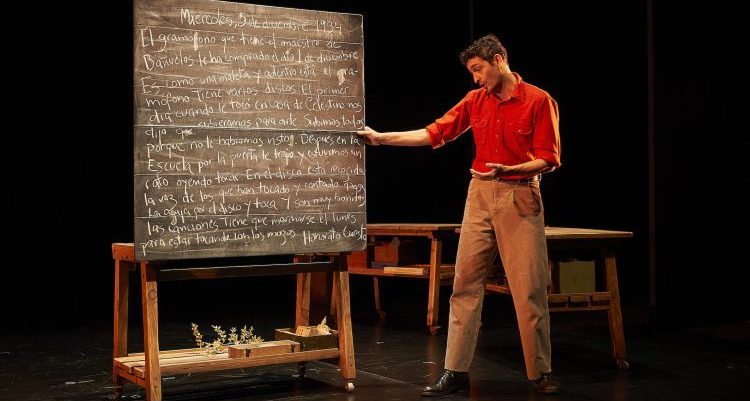
Antoni Benaiges was born in 1903 into a Catalan family of rural republicans living in Montroig, Tarragona. He trained as a ‘mestre’, a teacher, and on graduating found work in a mixed school in a tiny village in Bañuelos de Bureba, Burgos. There, in a brief two years, Benaiges quietly revolutionised the lives of the children, and sowed the seeds that would shake up Spanish education decades on.
The Freinet Technique
Benaiges applied the innovative methods of French pedagogue Célestin Freinet in his own rudimentary classroom. He brought in a basic printing press along with a gramophone, encouraging the children to produce illustrated publications, describing and drawing their own experiences. He gave space to their dreams, among which, was to see the sea for the first time. He made a promise that he would take them to the Catalan coast where he grew up, but the promise was never kept. In 1936, at the age of 33, Benaiges was shot by the fascist militia group La Falange.
On Stage
Spanish dramaturg Alberto Conejero and Catalan visual poet Xavier Bobés team up to tell the story of Benaiges in a stage production comprising found and reproduced objects, and found and reproduced words. A process of investigation began when Conejero, creator of acclaimed 2013 play La piedra oscura that also broached Spain’s troubled past, discovered the 2017 book by the journalist Francesc Escribano, historian Queralt Solé, and photographer Sergi Bernal. It pieced together the story of the forgotten school teacher, when his body was thought to be among those exhumed from a common grave in La Pedraja, Burgos in 2010.
The Sea
Sergi Torrecilla plays Benaiges in the play, which seeks to celebrate the enthusiasm and vision of a tutor who wished to learn from the children as much as he did teach them. “He made the children’s lives in an isolated village, without electricity or potable water, important”, says Conejero. Benaiges encouraged the children to cooperate and create, be “authors of their own stories, not just subjects of someone else’s”.
The production draws on Benaiges own writings in Spanish, as well as the words of the children, but also applies the Freinet methodology to the rehearsal space, in what Torrecilla calls, “an education in life, and in how to relate to one another as human beings”.
Theatre of Found Objects
Xavier Bobés, whose visually poetic pieces, such as Coses que s’obliden fàcilment evoke memory and promote empathy through objects, even though they may be unfamiliar culturally, explains that this was the first time he had worked in the same way with text. “Most of the materials we use here are genuine, or reproductions, we make use of a Freinet printing press, plus reproductions of the illustrated booklets, created by the children and now very fragile, as a means to transport us to the time.”
Benaiges was among some 400 teachers, women and men, killed by Franco’s militia in a 12-month period. “At a time when we are once again subject to such dangerous deeply-conservative discourse,” says Conejero, “we pay homage to Benaiges, and to all teachers, who believe in learning as a lifelong study of how to be human.”
El mar: visió d’uns nens que no l’han vist mai
in Spanish and Catalan
Teatre Nacional de Catalunya
until 6 March 2022
